‘Our kids aren’t growing up’: Epidemic of gun violence scars, kills Tallahassee’s Black children
This story was produced as part of a larger project for the 2019 National Fellowship.
Other stories in this series include:
13 million missed meals in Leon: 'Meal Deficit Metric' aims to track hunger across Florida
Coronavirus: Lack of access to tests hampers care in Tallahassee's poorer neighborhoods
Going granular: Why deep dives into health data can help kids in poor zip codes like 32304
At 32304's Riley Elementary, staff 'serve a greater need than just educating the mind'
'No access': Poor, isolated and forgotten, kids of 32304 see their health care compromised
Distanced from assistance: Rampant health problems in Gadsden mirror coronavirus risk factors
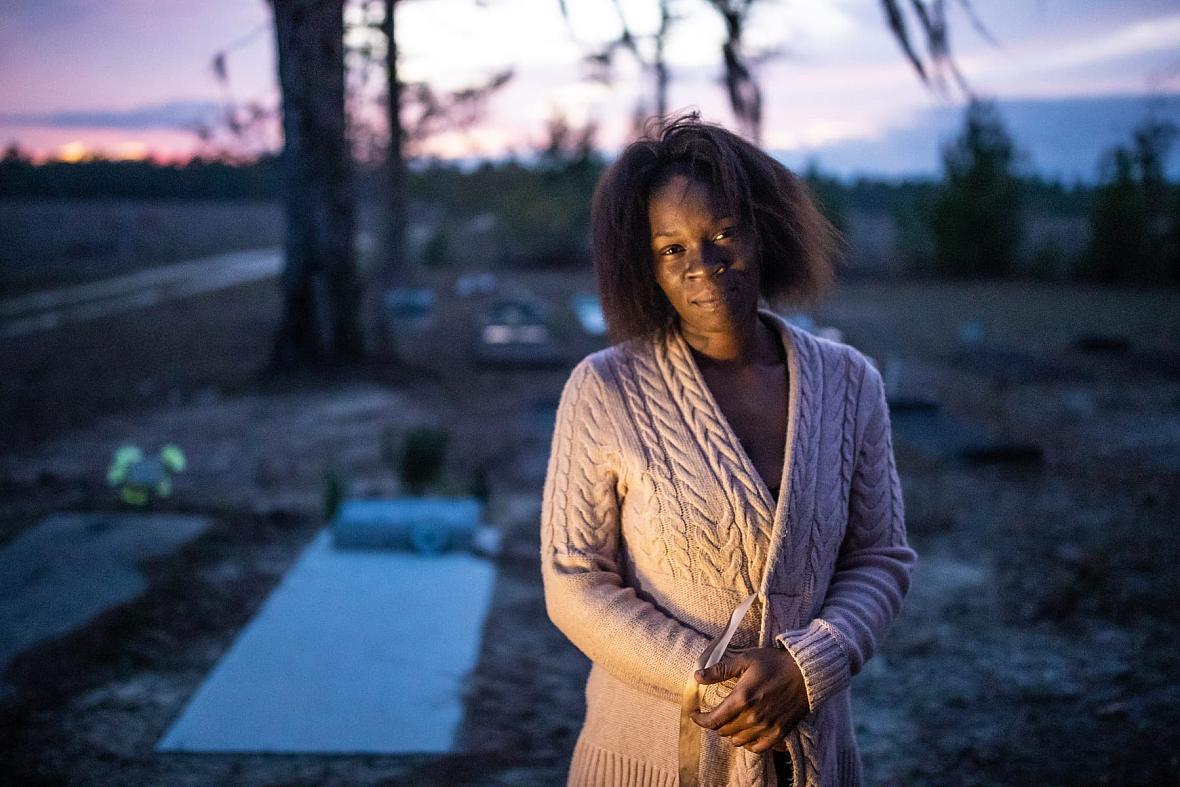
ALICIA DEVINE/TALLAHASSEE DEMOCRAT
When she’s alone, Koquisha Cook talks with her daughter as if she were still alive.
She hums the tunes her Jamirica “Noonie” danced to on the bare front porch of their home, a pale-yellow apartment tucked in the Joe Louis Street public housing complex.
It's where the 15-year-old hip-hop loving girl was shot dead Aug. 23, 2019.
That morning, her brother Matthew Cook was showing Noonie and their friend Amarion James a gun he bought off the streets for $200. He pointed the gun at her head in what he told police was play fighting. But he pulled the trigger and she was gone.
Now, all Cook has are memories and photos of her dancing daughter. She keeps them under the glass table in the family room and along the walls. In one picture, Noonie is clad in pink, with white angel wings.
During car rides, Cook and Noonie would sing together. Their most beloved song was "All I Want Is Forever." But she didn't have forever with her Noonie.
"Our kids aren’t growing up, you know. They’re dying. They’re dying too fast." - Koquisha Cook
"Our kids aren’t growing up, you know. They're dying," she said. "They’re dying too fast."
In Tallahassee’s low-income neighborhoods, gun violence is cutting short the lives of Black children — and creating lasting trauma in survivors. It's perhaps one of the most alarming health disparities among kids in Tallahassee: Noonie is one of at least 50 children injured or killed by firearm in Leon County over the past decade, according to law enforcement records. Roughly a fifth of the incidents were fatal.
INSTAGRAM SCREENSHOT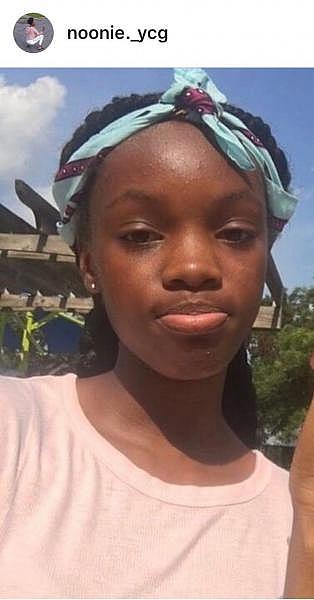
Tallahassee Police Department records show all the children were Black, except three. Leon County Sheriff’s Office has not yet returned an inquiry into details on four cases as of Friday afternoon.
About a third of those shootings occurred in the impoverished 32304 ZIP code, and about a quarter of the victims, including Noonie, lived there — the highest count of any ZIP code in the county.
Most of the remaining shootings were tied to other ZIP codes in high-poverty Frenchtown, Southside and Bond neighborhoods.
Public health experts have long regarded gun violence as a health problem — and they’ve studied it as one. The victims, they know, aren’t random. The same factors that have been shown to impact a person’s health, like education, income and environment, coincide with violence.In the past few weeks alone, gunfire has injured at least three kids, including a 10-year-old struck by a bullet shot through the window just after midnight. Shots were fired that night in the Stuckey Avenue neighborhood. Earlier this summer, in a drive-by shooting on Holton Street, a 12-year-old boy was taking out the trash when he was shot in the face by a stray bullet.
Kids living in destitute neighborhoods are at a higher risk of gunfire injury or death than kids in Tallahassee’s wealthier areas. Of the dozens of children, only three were from the affluent 32312 ZIP code, and only one of the shootings happened there, according to TPD's records.
“For far too long, we don’t look at gun violence as a public health issue,” said epidemiologist Ed Clark of Florida A&M’s Institute of Public Health. “You think, ‘violence and guns — that's a law enforcement issue.’ But it is deeper than that.”
Balloons, a single candle and a bouquet of plastic flowers are placed on a front porch in the building. TORI SCHNEIDER/TALLAHASSEE DEMOCRAT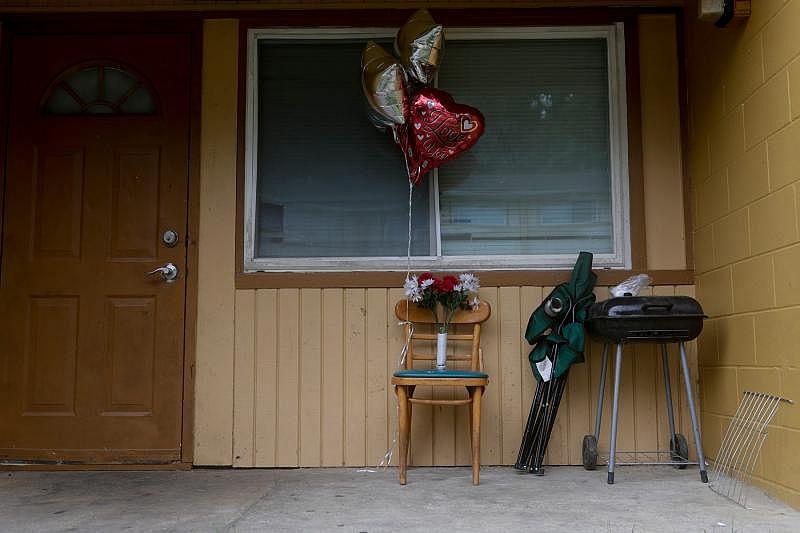
Funds to study, address gun violence disparity are lacking
The Giffords Law Center to Prevent Gun Violence reports Black children are 10 times more than likely to be killed in a gun homicide than white children.
But unlike other health disparities, like heart disease among Black women or diabetes among people with Hispanic heritage, few federal funds have been used to study gun violence and the best ways to address it.
An amendment passed two decades ago in effect prevented the Centers for Disease Control and Prevention from using federal funds to study gun violence as a public health issue.
The CDC tracks violent injuries. But the National Rifle Association lobbied for a rider implemented in 1996 that mandated “none of the funds made available for injury prevention and control at the Centers for Disease Control and Prevention (CDC) may be used to advocate or promote gun control.”
Out of fear of losing funds or being penalized, the CDC refrained from funding gun violence control research. In turn, experts say that barrier impacted state health departments like Florida’s, which are funded by the CDC. In 2018, Congress finally clarified the amendment, giving the agency the green light.
Clark was part of a Tallahassee gun violence prevention team that traveled to Chicago several years ago to observe an evidence-based violence prevention model called Cure Violence. The program embeds people in communities as violence "interrupters" — stopping the disputes as they occur.
But ultimately, City Commissioners voted against bringing Cure Violence to Tallahassee, calling the $400,000 to implement it too much of a gamble.
"The Cure Violence protocol was actually developed to address gang violence," Clark said.
Koquisha Cook, 36, sits in her living room as she shares fond memories of her daughter Jamirica "Noonie" Cook, 15, who was shot and killed last year in her home in the Springfield Apartment complex. Photographs and tributes to Noonie decorate Cook's home. ALICIA DEVINE/TALLAHASSEE DEMOCRAT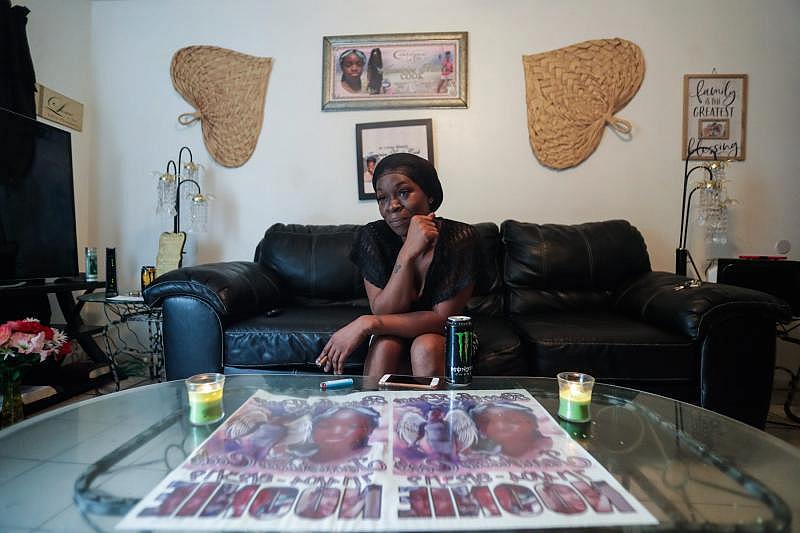
Just a few weeks ago, the Tallahassee Police Department said last year’s string of shootings were likely tied to a long-standing dispute between south side and north side gangs.
The headstone for Jamirica "Noonie" Cook. ALICIA DEVINE/TALLAHASSEE DEMOCRAT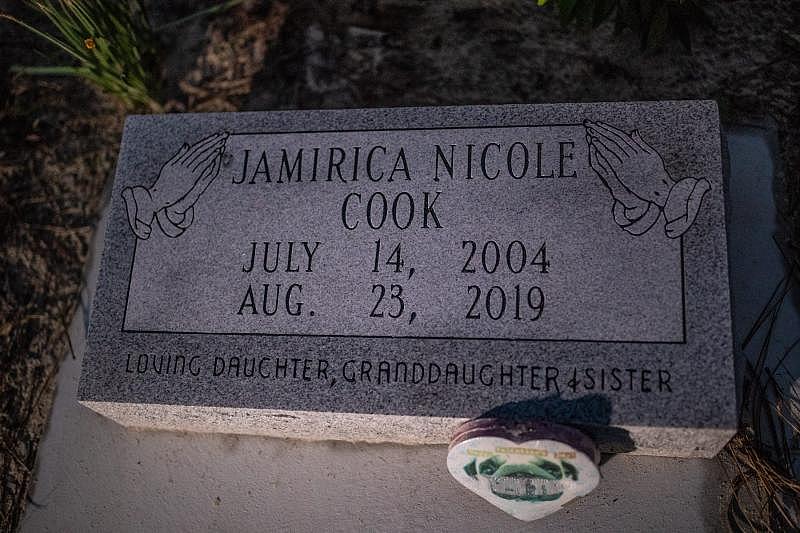
"You intervene and deescalate events by relationship," said Christic Henry, a facilitator.
Working with law enforcement intelligence to predict possible incidents, the homegrown program has interrupted more than 30 incidents of violence, Henry said.
Though LCSO's funding helped "seed the experiment," Henry said, the group needs more, longer term funds in order to train and employ more interrupters to embed throughout specific low-income neighborhoods.
The group's interrupters — "street advocates" — say the city's "crime narrative" is rooted in youth trying to scrape by and survive in whatever ways they can: Sometimes that's dealing drugs, leading to conflict which can end in violence as a result of disruption to the supply and demand.
"This is a system of survival through economic barriers," Henry said. "There's been a disinvestment in these communities that have happened over the years that caused this culture to prevail. If we don't do and move in ways that create community-wide equity, we're going to be dealing with these issues 20 years from now, and again."
Springfield Apartments off Joe Louis Street. TORI SCHNEIDER/TALLAHASSEE DEMOCRAT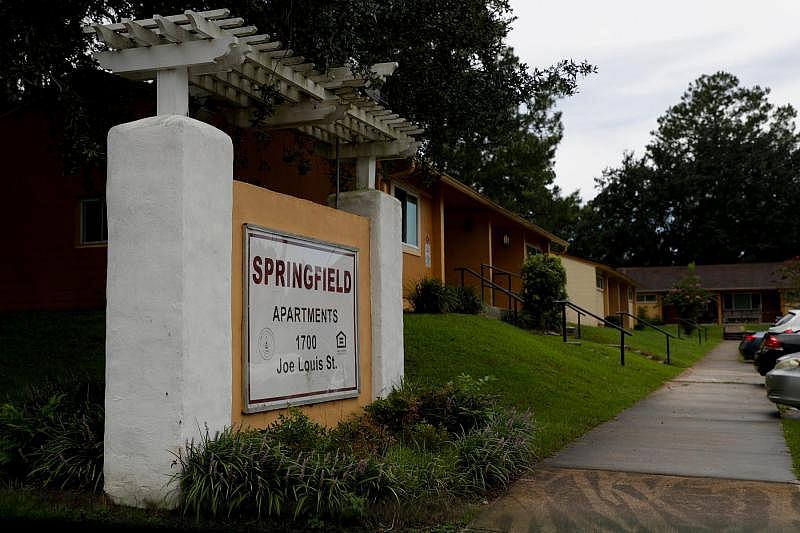
‘Pretty strong medicine’
State Attorney Jack Campbell has charged then 16-year-old Matthew, who is now 17, as an adult for the killing of his sister Noonie a year ago. At the time of the tragedy, he already was on probation and had committed past juvenile crimes.
"I've got to have some pretty strong medicine," Campbell said. The adult criminal justice system, he said, "affords" him that. "I've got somebody who can, has potential, to be violent through their 20s. And so, I need to be able to make sure that I keep safe guards."
But epidemiologist Clark says that's not the way.
“It does these kids a disservice to look at them as a group of violent kids," he said. "A lot of these kids don't have the resources to redirect their energies or their patterns."
Koquisha Cook, 36, sits with her son Matthew Cook, 17, in their living room. Matthew is facing charges on the shooting and killing of his sister last year. ALICIA DEVINE/TALLAHASSEE DEMOCRAT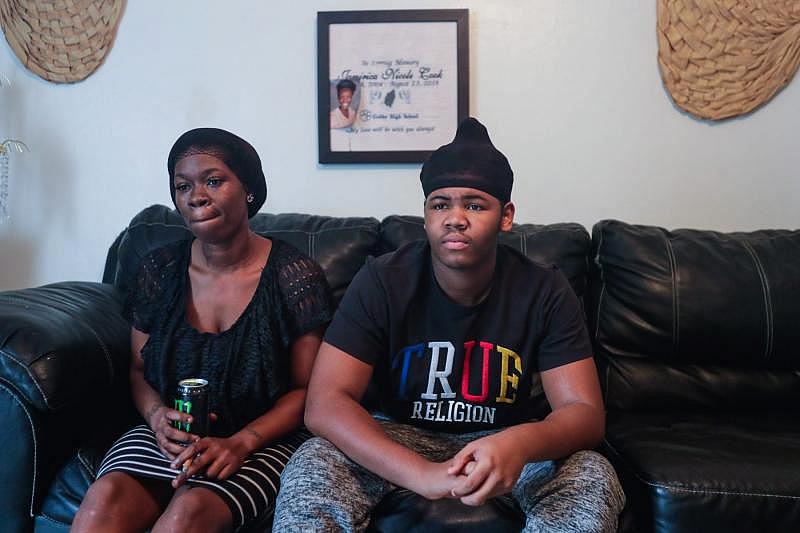
It’s unclear from whom Matthew bought the gun. During an interview with the Democrat a few months after the tragedy, the teen, who was on pre-trial release, couldn’t quite string together words.
But experts say a lack of collective security in neighborhoods like his is one reason young people turn to guns. Matthew told police he bought the gun to protect his house.
"They know how valuable it is to not be perceived as a vulnerable person or a victim. Or you will be victimized," Clark explained. In turn, kids covet a reputation of being able to stand up for themselves, he said.
"The youth are not feeling safe or protected from within or out. Police brutality is making them feel like they’re not protected by the police ... they’re bullied by their peers. They don’t feel like they have anywhere to flee for safety and support." - Christic Henry
Clark grew up in the Bajas, a quadrant of Miami where the sounds of gunshots were commonplace. He’s lost friends and family to gunfights. His gang was his “street family."
"We learned to depend on each other for protection," he said.
In mentoring sessions with teens in the juvenile justice system, the Peacemakers' street advocates report youth are burdened by feelings of insecurity.
"The youth are not feeling safe or protected from within or out," Henry said. "Police brutality is making them feel like they're not protected by the police ... they're bullied by their peers. They don't feel like they have anywhere to flee for safety and support."
‘Toxic stress’ breeds gun violence
Cook couldn’t bring herself to step foot in the bloodstained apartment after her daughter’s death. She, Matthew and her three other children moved to a south side rental tucked behind car repair shops, a propane supply warehouse and meat grocery.
The single mom used to clean homes to scrape by. Now she washes dishes at a local retirement home. Over the years, she gave up hope receiving any child support from her children's fathers.
When Noonie was 7, her dad owed more than $14,000 in child support, court records show, and Cook's relationship with him was turbulent. Matthew's dad has several felony and domestic violence charges, and now lives in Suwannee County. Both kids took Cook's last name instead of their dads'.
"For people who are growing up in those types of environments, the ‘p’ in post-traumatic stress disorder doesn’t stand for ‘post’ — it stands for ‘perpetual.’"- Ed Clark, epidemiologist
“For people who are growing up in those types of environments, the ‘p’ in post-traumatic stress disorder doesn’t stand for ‘post’ — it stands for ‘perpetual,’” Clark said. “Because they don’t get to get to the ‘post.’ Before they get to process one atrocity, another one occurs. These people are living in an environment of toxic stress."
Cook and her children have been in the thick of that stress — and its aftermath.
Koquisha Cook, 35, left, and her boyfriend Kevin Moore carry plants as they walk to Noonie's gravesite. Jamirica "Noonie" Cook, 15, was shot and killed last year in her home at Springfield Apartments. Noonie's sister Sharail “Sugar” Sampson, 14, carries a heart-shaped box of chocolates to leave on her sister's grave. ALICIA DEVINE/TALLAHASSEE DEMOCRAT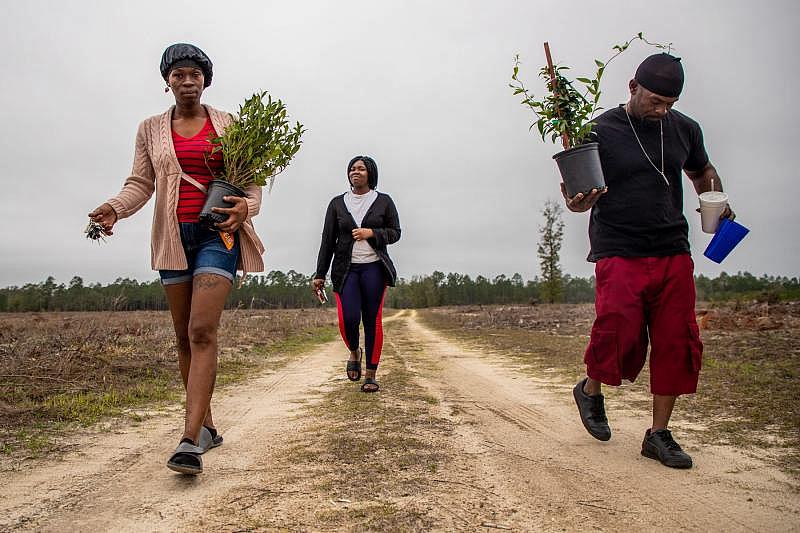
Three months after attending Noonie's funeral, Amarion James, who was in the bedroom with Matthew when she was killed, was killed, too.
The night of Nov. 17, 2019, after leaving the fair, Amarion and two other kids were shot. Amarion, hit three times, died in the hospital that night. He was 16. Days later, Trent Lee, 19, also would die after fighting for his life in the hospital.
“Say hi to Noonie for me,” Cook wrote in a Facebook tribute post after Amarion's death. The creative, witty "Mari" was like a son to Cook. He called her "Auntie Keesha" and spent holidays with her and the kids. He, Noonie and Matthew were close friends, like siblings, she said.
"He was everywhere we went. He didn't miss nothing," she said in the living room of her Woodville rental. "But now, I'm broken."
‘We all deserve an equal chance’
The same night of the fair, the Florida A&M Rattlers snagged an intense win against rival Howard University. Head Coach Willie Simmons and his pregnant wife Shaia Simmons had plans to celebrate with friends at Waffle House.
But on the way, about a block from the fairgrounds, they heard a series of gunshots.
They saw a crowd of people. Two bodies lying on the ground. A trembling teenage girl with blood-stained hands. The girl was trying to stop the bleeding wound from the bullet lodged in her dying boyfriend’s head.
A pregnant Simmons rummaged hand sanitizer and baby wipes from her car. She used the cloths to clean the blood off the girl’s hands and tried to console her. The girl couldn't utter a word amid her shock.
It was a juxtaposition that left Simmons in a haze: The new, innocent Black life she’d soon birth into the world, while cleaning the remnant blood of one just taken.
ALICIA DEVINE/TALLAHASSEE DEMOCRAT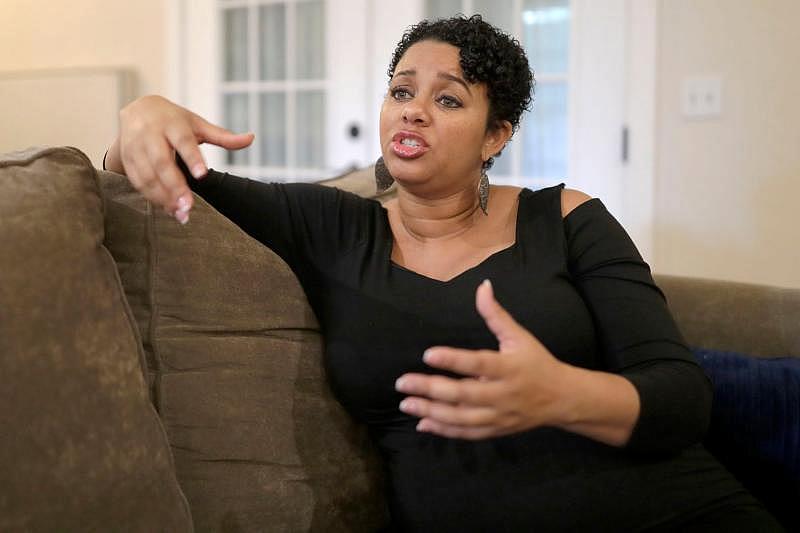
"It’s troubling. Because no matter how much melanin you’re born with, we all deserve an equal chance for a whole, full life." - Shaia Simmons
“It’s troubling,” she said. “Because no matter how much melanin you’re born with, we all deserve an equal chance for a whole, full life.”
Simmons thought of all the times her kids called her a "helicopter mom," all the times she said they couldn’t walk from the fair or the movies at night alone with their friends.
“When I tell you not to go, that’s why,” she told her 13-year-old daughter. “I want you to live.”
Back in her south-side home, Cook battles the lethargy and grief with Monster energy drinks. With each day, the tragedies kick in more and more.
"It feels like it’s a dream," she said. "But it’s not."
On a gray-skied winter day, carrying gardenia seedlings, Cook follows a dirt road off Woodville Highway a quarter mile into a Wakulla Forest clearing. The small patch of land is where her relatives are buried. She never imagined she’d have to bury her dancing daughter — let alone a month after her 15th birthday. But Noonie rests here now, too.
"I wish they would get these guns off the streets," Cook said. "These babies — they're too young to be dying. I just want it to stop."
[This story was originally published by Tallahassee Democrat.]

